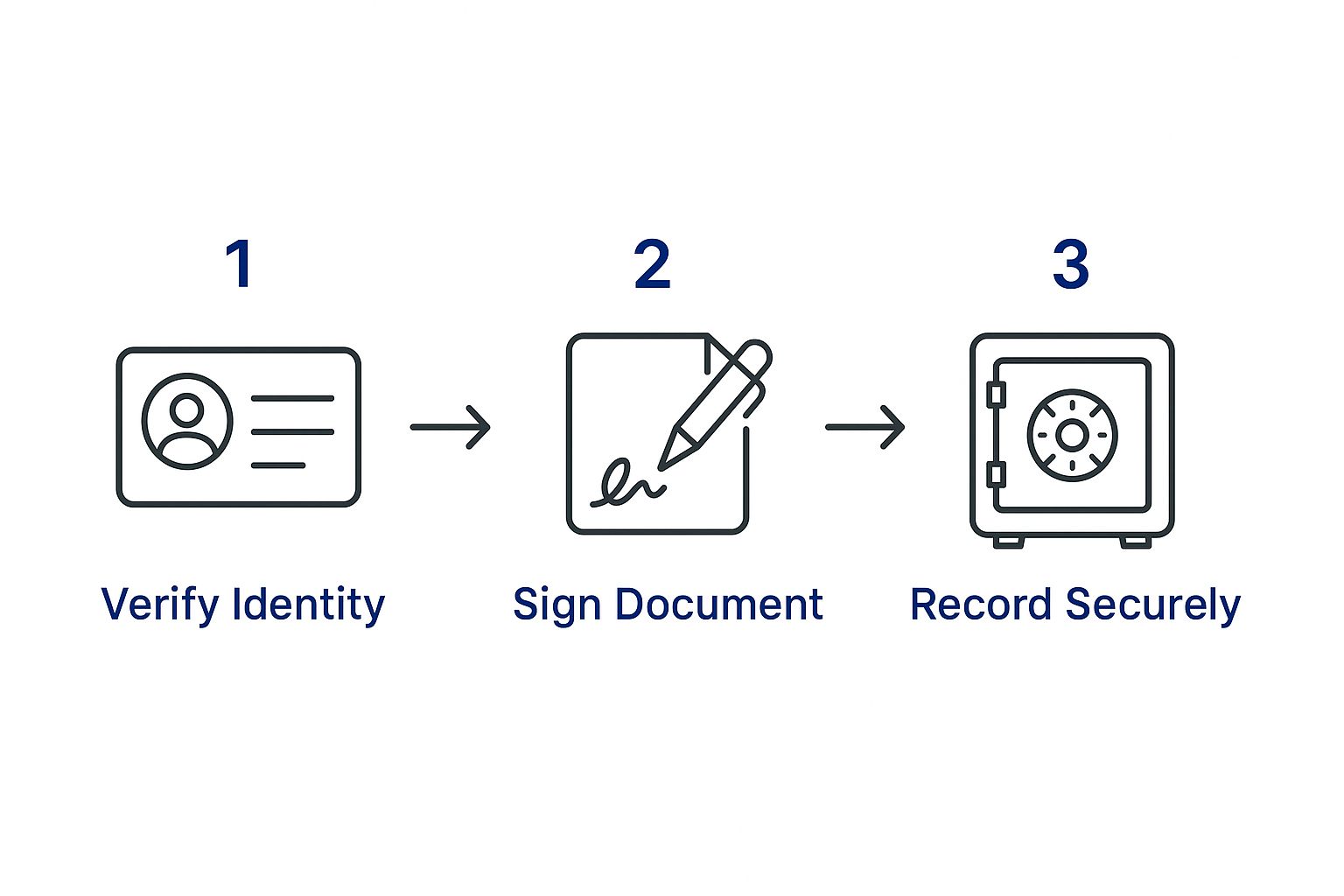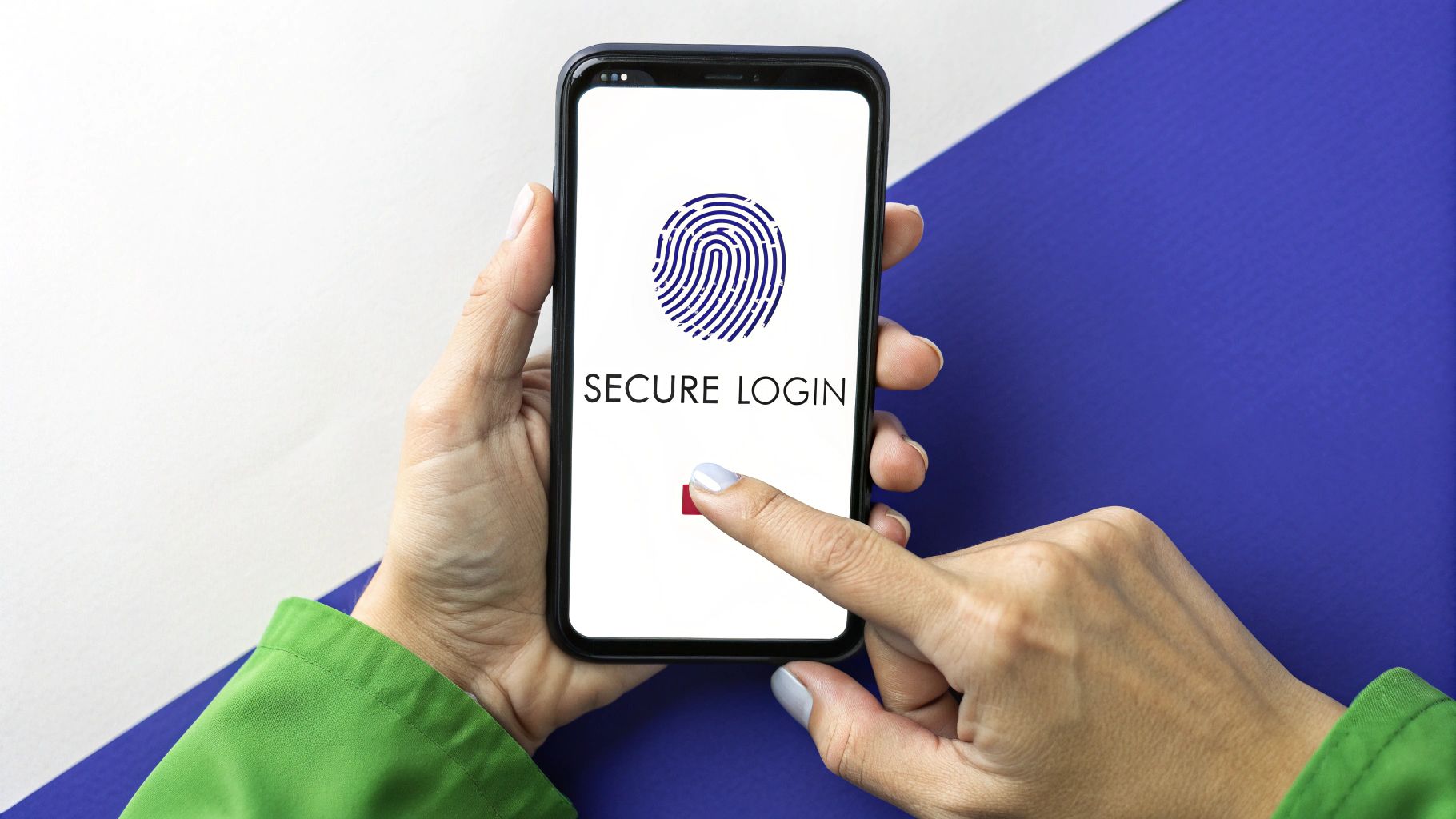Remote Online Notary Services | Secure & Convenient
- WebsiteFix Technical Partner
- Jun 15, 2025
- 14 min read
Understanding Remote Online Notary: Your First Digital Handshake

This screenshot showcases the DocuSign platform for remote online notarization. Its clean design and clear buttons hint at a smooth process for everyone involved. It really emphasizes how simple and accessible remote online notarization can be.
Imagine needing a document notarized at the last minute – say, Sunday night. Instead of a frantic search for an open notary public, remote online notary services let you connect with a commissioned notary online, often within minutes. This shift to digital document authentication is changing how we handle important paperwork.
Traditionally, getting something notarized often meant a trip to the bank during limited business hours, waiting in line, and crossing your fingers that your ID was acceptable. Remote online notarization provides a welcome alternative to this often cumbersome process.
Now you can notarize documents from anywhere – your home, office, or even a coffee shop. This increased accessibility is especially helpful for people with mobility limitations, those in rural areas with limited notary access, or anyone with a busy schedule.
This convenience isn’t just about saving time. It's about making crucial legal processes more accessible. Think of a military spouse stationed overseas who needs to execute a power of attorney. Remote notarization allows them to do this from anywhere, eliminating logistical headaches and delays.
What's more, the remote online notary service market is booming. Driven by the increasing adoption of digital technologies, the market is projected to reach $1,836.6 million by 2033, growing at a CAGR of 18.2% from 2025 to 2033. This shows the increasing value and convenience people are finding in this digital approach. For a deeper dive into this growing market, check out this resource: Remote Online Notary Service Market Growth.
But is it as secure as traditional methods? It's natural to be a little skeptical about digital processes. However, remote online notarization often incorporates even stronger security measures than its paper-based counterpart. Here’s a related article you might find interesting: The Importance of a Notary Public for Legal Documentation. We'll explore how digital authentication maintains legal validity while adding layers of security not previously available. This shift towards digital isn't just a temporary trend, it's a permanent move to more efficient and secure document authentication.
How Remote Online Notary Sessions Actually Work Behind the Scenes

The infographic above gives you a simplified overview of a remote online notary session. It shows the flow from verifying who you are to securely saving the signed document. These three steps ensure everything is legally sound and protected. As you can see, remote notarization makes the whole process much more efficient than traditional methods.
Imagine it as a series of carefully coordinated checks, all happening digitally behind the scenes. From the moment you upload your document, the process is set in motion. Let's break down each step in detail.
Identity Verification: More Than Just Showing Your ID
The first step is confirming who you are – and it's much more rigorous than simply showing your ID to a notary in person. Advanced software scans your government-issued ID. This isn't just a quick glance; the software checks your ID against official databases to make sure it’s legitimate.
At the same time, facial recognition technology compares a live image of you to the photo on your ID. It's like having a highly trained expert examine your ID for any discrepancies. Think of it as a digital detective ensuring everything matches up.
Many platforms also use something called Knowledge-Based Authentication (KBA). This involves answering very specific questions about your personal history – questions only you would know. These are pulled from secure sources like credit reports. This multi-layered approach ensures a high degree of certainty about your identity.
The Digital Signing Ceremony: A Secure and Binding Agreement

The live video session with the notary public is the core of the process. This isn’t just a friendly chat; it's a legally binding event. The notary confirms your identity, makes sure you understand what you're signing, and witnesses you applying your electronic signature. Everything that happens in this session is recorded, encrypted, and stored securely.
To better understand the differences between traditional and remote notarization, let's look at a comparison:
Traditional vs Remote Online Notarization Process Comparison
Process Step | Traditional Notarization | Remote Online Notarization | Time Required | Security Level |
|---|---|---|---|---|
Identity Verification | Physical ID presented | ID scanned and verified with KBA and facial recognition | ~5 minutes | Moderate |
Document Signing | Sign in person | Sign electronically | ~2 minutes | Moderate |
Notarization | Notary applies physical stamp | Notary applies digital seal | ~2 minutes | High |
Record Keeping | Paper document stored | Digital document stored on secure server/blockchain | N/A | Moderate |
Overall Process | Requires travel and scheduling | Can be done from anywhere, anytime | ~1 hour+ | High |
This table highlights the key differences in security, time required, and overall convenience between the two methods. Remote online notarization significantly reduces the time and effort involved while enhancing security.
Securing the Record: Blockchain-Level Protection
After you’ve signed, the notary applies their digital seal – a unique, cryptographic signature that's much more secure than a traditional stamp. This seal is connected to a tamper-evident record. This means any attempt to change the document after it’s been notarized is immediately detectable.
But where is all this information kept? Not just on a regular company server. Many platforms utilize blockchain technology, or equally robust storage solutions, to protect the integrity of the notarial act. This creates an audit trail that’s far superior to traditional paper-based systems.
Think of it as your notarized document being kept in a high-security digital vault with multiple layers of protection. This meticulous process makes remote online notarization not only convenient but extremely secure. In fact, many legal experts consider it more secure than traditional methods. This high level of security gives everyone involved confidence in the legality and validity of the document.
Navigating The Legal Landscape: State Rules That Actually Matter

This screenshot from the National Notary Association website highlights their resources on remote online notarization, demonstrating their commitment to educating notaries and the public about this evolving field. The site provides valuable information for understanding the often-confusing world of RON laws.
Think of the legal landscape for remote online notarization (RON) as a jigsaw puzzle, constantly being rearranged. Each state has its own unique regulations, creating a complex picture for anyone trying to use these services. Some states embrace digital notarization, while others proceed with caution.
This inconsistency can create headaches, especially with interstate transactions. Imagine you live in Nevada but need to notarize a document for a business deal in California. Which state’s rules apply? It's a critical question to consider.
Understanding the Key Legal Requirements
Several key pieces determine whether a remote online notarization is legally sound. First, the notary’s commission is essential. They must be properly commissioned in the state where they perform the notarization, much like a judge needs to be licensed in the jurisdiction where they preside.
The technology used also needs to meet state-specific requirements. Think secure audio-visual communication and robust identity verification, similar to two-factor authentication for your bank account. These requirements are there to protect both the signer and the notary.
Finally, meticulous record-keeping is paramount. A secure audit trail, including recordings of the session and digital copies of the documents, is like having a video recording of a contract signing. This helps ensure the integrity of the notarized document.
Interstate Recognition and Cross-Border Challenges
Things get even more interesting with interstate and international transactions. Thankfully, many states have adopted the Uniform Electronic Transactions Act (UETA). This act helps standardize the recognition of electronic signatures and notarizations across state lines, similar to how a driver's license is generally accepted across the US.
However, not all states have adopted the UETA, and even among those that have, interpretations can differ. This can lead to challenges for nationwide implementation and cross-border recognition of remote online notarizations.
State-Specific Focus: Nevada
Nevada has been a pioneer in adopting remote online notarization. The state has established a comprehensive legal framework for its use, making it easier for businesses and individuals in Nevada to benefit from the convenience and security of RON.
Nevada's approach to digital notarization could be seen as a model for other states, paving the way for wider acceptance across the country. This proactive stance encourages innovation and streamlines legal processes.
The Future of Legal Frameworks for Remote Notarization
The legal world surrounding remote online notarization is constantly evolving. As technology improves and more states pass RON legislation, we can anticipate greater standardization and broader acceptance. This will likely lead to simpler processes and improved efficiency in various industries, from real estate to healthcare.
Want to delve deeper into the future of online notarization? Check out this informative article: 9 Reasons Why Online Notarization is the Future of Document Verification.
The adoption of RON isn't just a passing trend; it's a necessary adaptation to our increasingly digital lives. Staying informed about your state's regulations and choosing a trusted RON provider that prioritizes compliance and security is crucial. This ensures your remote notarization is legally valid and widely recognized.
Choosing Technology Platforms: What Makes Digital Notarization Secure
Let's talk security when it comes to remote online notarization (RON) platforms. Not all platforms are created equal. Think of it like choosing a security system for your home—you wouldn’t pick the cheapest option without considering its protective capabilities. You want something robust, reliable, and capable of safeguarding your valuables. Similarly, with RON platforms, you need to ensure your documents and sensitive information are protected.
Reliable RON platforms use a combination of technologies, working in concert, to provide a secure environment. This often includes blockchain-based audit trails, offering an immutable record of every transaction. It also means employing military-grade encryption to protect the data being transmitted. And, to stay ahead of bad actors, real-time fraud detection is critical.
But security isn’t everything. Imagine a bank vault with impenetrable walls but a complicated lock that only a handful of people can operate. Not very practical, right? The best RON platforms balance top-tier security with user-friendliness. Think intuitive interfaces that anyone, regardless of their tech savviness, can navigate with ease.
Key Security Features of Leading Platforms
Think beyond simple passwords. Leading RON platforms use multi-factor authentication. This means confirming your identity through several channels—maybe a code sent to your phone, coupled with a fingerprint scan. It's like having multiple locks on your front door.
Biometric analysis, such as facial recognition, adds yet another layer of security, making impersonation extremely difficult. And then there's knowledge-based verification. This involves answering questions that only you would know, further solidifying your identity.
This screenshot from NotaryCam gives you a sense of what a user-friendly interface can look like. Notice the clear emphasis on security and compliance, combined with a clean design for scheduling appointments. It projects an image of professionalism and trustworthiness.
Understanding Compliance Certifications and Integrations
Just like you'd look for a bank that's FDIC insured, look for RON platforms with specific compliance certifications. SOC 2 Type II compliance, for example, signifies adherence to rigorous standards for security, availability, processing integrity, confidentiality, and privacy. It's a strong indicator that your data is being handled with the utmost care.
And what about integrating with your existing systems? A good RON platform should seamlessly integrate with your current business tools, document management software, and workflow automation processes. It should fit into your existing digital ecosystem like a glove.
Speaking of the market, the demand for RON is exploding. The e-notary software market is projected to leap from $261.99 million in 2025 to a whopping $797.53 million by 2037, representing a CAGR of over 9.6%. This growth is largely driven by the increasing global adoption of e-signatures. For a deeper dive into this burgeoning market, check out this E-Notary Software Market Research.
To help you navigate the landscape of RON platforms, let's look at a comparison of some leading providers:
Leading Remote Online Notarization Platform Features
Platform Feature | Security Level | Integration Options | Compliance Standards | User Experience Rating |
|---|---|---|---|---|
(Example: Audio-Video Recording) | (Example: End-to-End Encryption) | (Example: API, Webhooks) | (Example: SOC 2 Type II) | (Example: 4.5/5 Stars based on user reviews) |
(Example: Digital Signature) | (Example: Multi-Factor Authentication) | (Example: CRM, Document Management Systems) | (Example: HIPAA) | (Example: 4/5 Stars based on user reviews) |
(Example: Identity Verification) | (Example: Knowledge-Based Authentication) | (Example: Workflow Automation Platforms) | (Example: GDPR) | (Example: 4.8/5 Stars based on user reviews) |
This table provides a general framework; the specific features and ratings will vary depending on the platform. It's essential to conduct your own research and compare platforms based on your individual needs.
User Experience: The Final Piece of the Puzzle
Finally, never underestimate the power of a smooth user experience. A professional RON platform should be easy to use, even for first-timers. Think clear instructions, intuitive navigation, and readily available support resources. This ensures a streamlined and efficient process for everyone involved.
While security is the foundation of a reliable RON platform, a positive user experience is the key to its successful implementation. By considering these factors, you can choose a platform that safeguards your documents, simplifies your workflow, and meets the highest security benchmarks. This will also help ensure your notarized documents are accepted by banks, courts, and government agencies, making your entire RON experience seamless and secure.
Real-World Success Stories: Where Digital Notarization Shines

This screenshot from Wikipedia gives us a glimpse into the traditional role of a notary public – quill pens and official seals. It's a stark contrast to the modern, digital approach of remote online notarization (RON), highlighting how this technology brings this centuries-old process into the 21st century.
RON isn't just a tech upgrade; it's a practical tool with real-world impact. Think about Sarah, a military spouse stationed overseas. She urgently needed a power of attorney notarized for her husband's deployment. Traditional notarization would have been a logistical nightmare, costing precious time during an already stressful period. RON allowed her to handle it all quickly and easily, right from her kitchen table.
This kind of flexibility is crucial for businesses, too. Imagine a small business owner about to close a major deal, but stuck in COVID quarantine. Remote notarization saved the day, and the entire transaction. This is just one way RON is changing the way we do business.
Real Estate, Healthcare, and Beyond
Real estate is another area where RON truly shines. Agents are now closing deals with clients across the country, without anyone needing to travel. This efficiency saves time and money for everyone involved.
In healthcare, RON simplifies essential processes like advance directives, especially for patients with mobility issues. Picture a patient unable to leave their home or hospital bed. RON ensures they can still execute vital legal documents, easing the burden during a difficult time.
International Transactions and Streamlined Operations
International transactions are another area where RON is a game-changer. The usual hurdles of finding international notaries or coordinating across time zones disappear, simplifying global business. This opens up opportunities and reduces friction in international commerce.
Companies across various industries are also using RON to streamline operations. Law firms are processing estate planning documents more efficiently. Financial institutions are speeding up loan closings, leading to happier customers and faster processing. Even HR departments are using RON for employee agreements, simplifying onboarding for remote workers and boosting HR efficiency.
The Right Tool for the Job
Companies like DocuSign are leading the way with innovative solutions. DocuSign's Notary On-Demand, for instance, provides 24/7 access to a network of notaries, truly modernizing the notarization process. You can learn more about DocuSign's influence on digital notarization here. This constant availability is invaluable for anyone needing fast and reliable notarization services.
While RON offers many advantages, it's important to know which documents are suitable for this process and when traditional, in-person notarization might be the better option. This balanced perspective helps you choose the best method for your specific needs, ensuring both efficiency and legal soundness.
The Complete Picture: Benefits and Honest Limitations
This screenshot from the American Bar Association website highlights their resources on remote online notarization (RON), showing how the legal profession is increasingly embracing this technology. The availability of these resources underscores RON's growing acceptance and importance within the legal community.
Let's discuss the pros and cons of RON, providing a realistic view of this developing technology. While RON offers many advantages, it's important to be upfront about its current limitations. This balanced perspective will help you decide when RON is the right fit.
Benefits: Beyond Simple Convenience
RON offers more than just saving a trip to the notary public. For busy professionals, this convenience is invaluable, allowing them to finish important tasks quickly and efficiently. Imagine a real estate agent closing a deal with clients scattered across the country, or a business owner finalizing a contract while traveling abroad. RON makes these scenarios seamless.
For businesses, RON can significantly cut costs. Consider the usual expenses tied to traditional notarization: employee travel time, courier fees, and the notary's service fee. These costs can accumulate quickly, especially for companies handling many documents that require notarization.
RON also improves access for people with disabilities, the elderly, and those in rural areas with limited access to traditional notary services. It creates a more equitable system, ensuring everyone can access essential legal services.
Security is another key benefit. Digital audit trails, tamper-evident seals, and thorough identity verification often surpass the security measures of traditional notarization. These features offer peace of mind, knowing your documents are safe from fraud and unauthorized changes.
Limitations: Addressing the Challenges
Despite its advantages, RON has some limitations. Some users may find the technology challenging, like needing a stable internet connection or figuring out video conferencing software. These technical hurdles can be a source of frustration, particularly for those new to online platforms.
Another limitation is the patchwork of legal regulations. Not every state accepts RON for all document types. This inconsistency can be confusing, making it crucial to check the specific rules in your location.
Finally, there's a learning curve for everyone. Notaries need to adapt to new digital tools, and some people might initially question the legitimacy of digital processes. This hesitation is understandable, but education and clear communication about RON's legal validity and security are key to building trust.
Bridging the Gap: Industry Solutions
The industry is actively working to address these limitations. Improved user interfaces, better support systems, and educational programs are being developed to help users easily navigate the process. These efforts aim to make RON more user-friendly and accessible to everyone.
By acknowledging both the strengths and weaknesses of RON, we can appreciate its true potential. It's not a one-size-fits-all solution, but its benefits are clear. Weighing the advantages against the limitations and staying updated on industry developments will help you make the best choice for your specific needs. Ultimately, the decision between RON and traditional notarization hinges on your individual circumstances, the type of document, and your comfort level with technology.
Mastering Remote Online Notary: Best Practices and Future Trends
Success with Remote Online Notarization (RON) isn't just about clicking a button and joining a session. It's about understanding the process to ensure smooth, legally sound transactions every time. Think of it as adding a valuable new tool to your professional kit—one that saves time, money, and headaches.
Preparing for a Seamless Session
Before your session, make sure your documents are ready to be scanned. They should be crisp, clear, and free of anything that could block the scanner. This simple step avoids delays and ensures a smooth process.
Next, double-check your internet connection and camera. A stable connection and clear camera view are crucial for a successful video session. It’s like making sure the phone lines are clear for an important call.
Have your ID ready. Keep your driver's license, passport, or other accepted ID handy. This speeds up the verification process and saves you valuable time during the session.
Troubleshooting Common Issues
Even the best preparation can’t always prevent technical hiccups. Knowing how to troubleshoot common problems can save you time and frustration. If you have audio issues, test your microphone and speakers beforehand. A quick check can prevent audio headaches during the session.
If you run into document upload errors, make sure the file format and size are compatible with the platform. Most platforms use common formats like PDF, but confirming compatibility is always a good idea. This simple check can prevent frustration. You might be interested in: Unveiling the Insider Tips for Mastering Real Estate Notarization Like a Pro.
Record-Keeping Best Practices
After your RON session, proper record-keeping is essential. Know where to find and how to save your digital certificates. These certificates are your proof of notarization. They’re like digital receipts for your important documents.
Store copies of your notarized documents securely. This could be a secure cloud service or a physical file. Easy access to these copies can be vital if you ever need to prove the notarization.
Different document types have different rules about how long you need to keep them. Understanding these rules is crucial for compliance and helps you stay organized.
The Future of Remote Online Notary: Emerging Trends
RON is a dynamic field, constantly adapting to new technologies. Artificial intelligence (AI) is becoming a key player in identity verification and fraud detection. AI can analyze data to identify red flags that suggest fraudulent activity, boosting security.
Blockchain technology provides a secure, permanent record of every notarization. Each entry is like a link in an unbreakable chain, ensuring a tamper-proof audit trail.
Mobile platforms are putting RON in your pocket. Now you can notarize documents from your smartphone or tablet, anywhere you have a connection. Imagine closing a time-sensitive deal while traveling, without needing a laptop.
Looking ahead, we can expect even more innovation. Biometrics will go beyond facial recognition, using unique identifiers like your voice or even your gait to verify identity.
Integration with Internet of Things (IoT) devices could further streamline the process. Imagine your smart home device automatically preparing your documents for a RON session.
Finally, a move towards global RON standards will simplify international transactions. This will make cross-border notarizations simpler and more efficient, opening up new opportunities for global business.
The future of RON is bright, promising greater accessibility and enhanced security. These advancements will ensure that remote notarization remains a secure and convenient choice for years to come.
Ready to experience the convenience and security of remote online notarization? Visit Signature on Demand today to learn more about our services and how we can simplify your legal processes.
Article created using [Outrank](https://outrank.so)







Comments